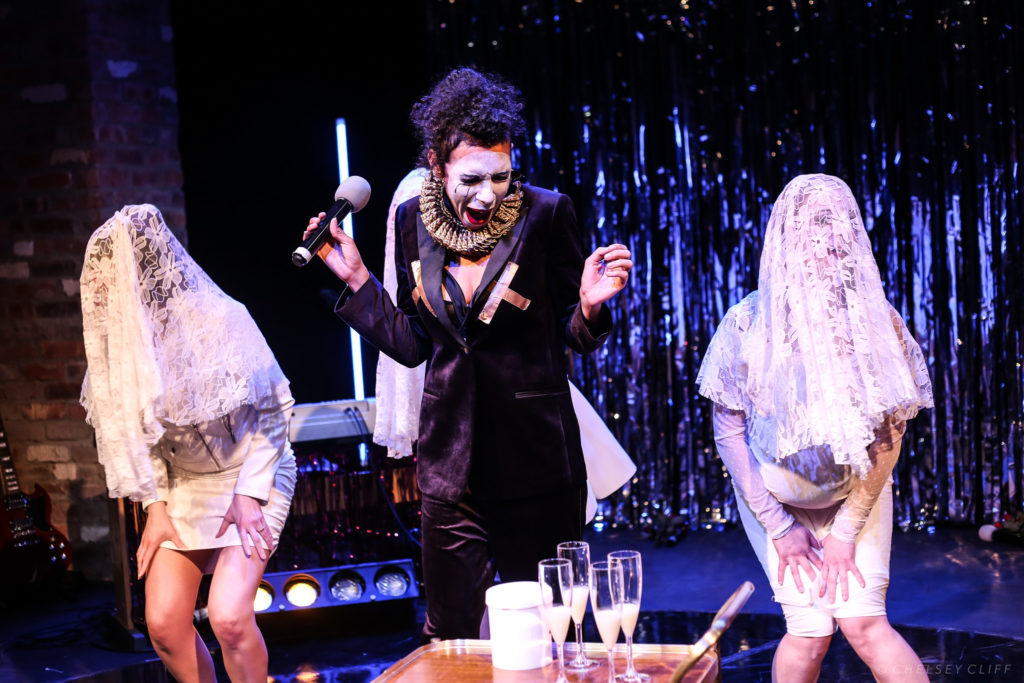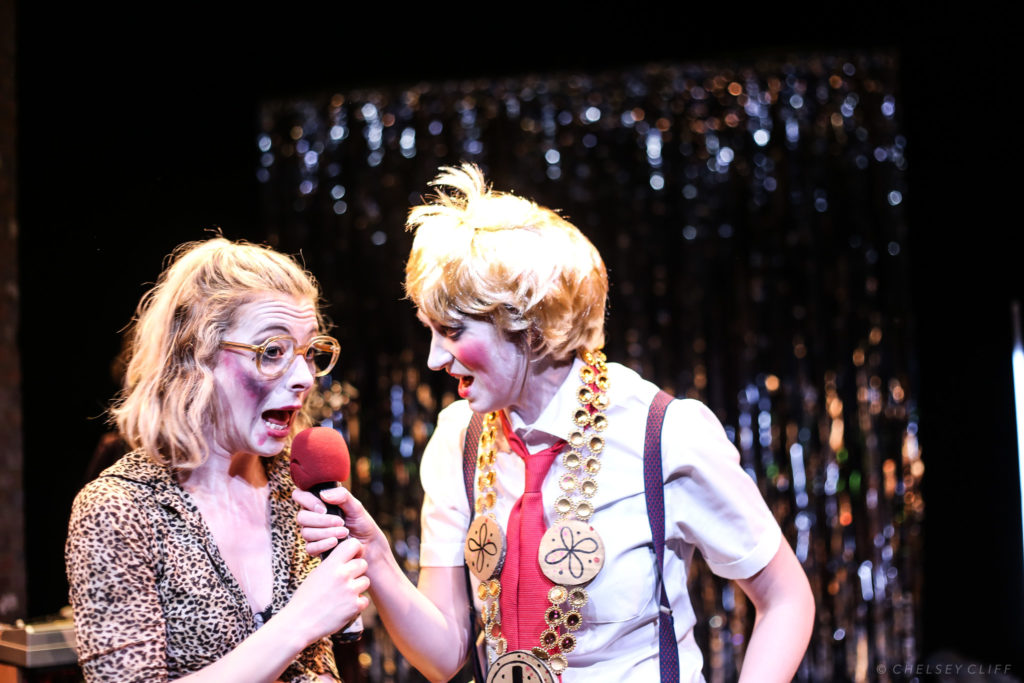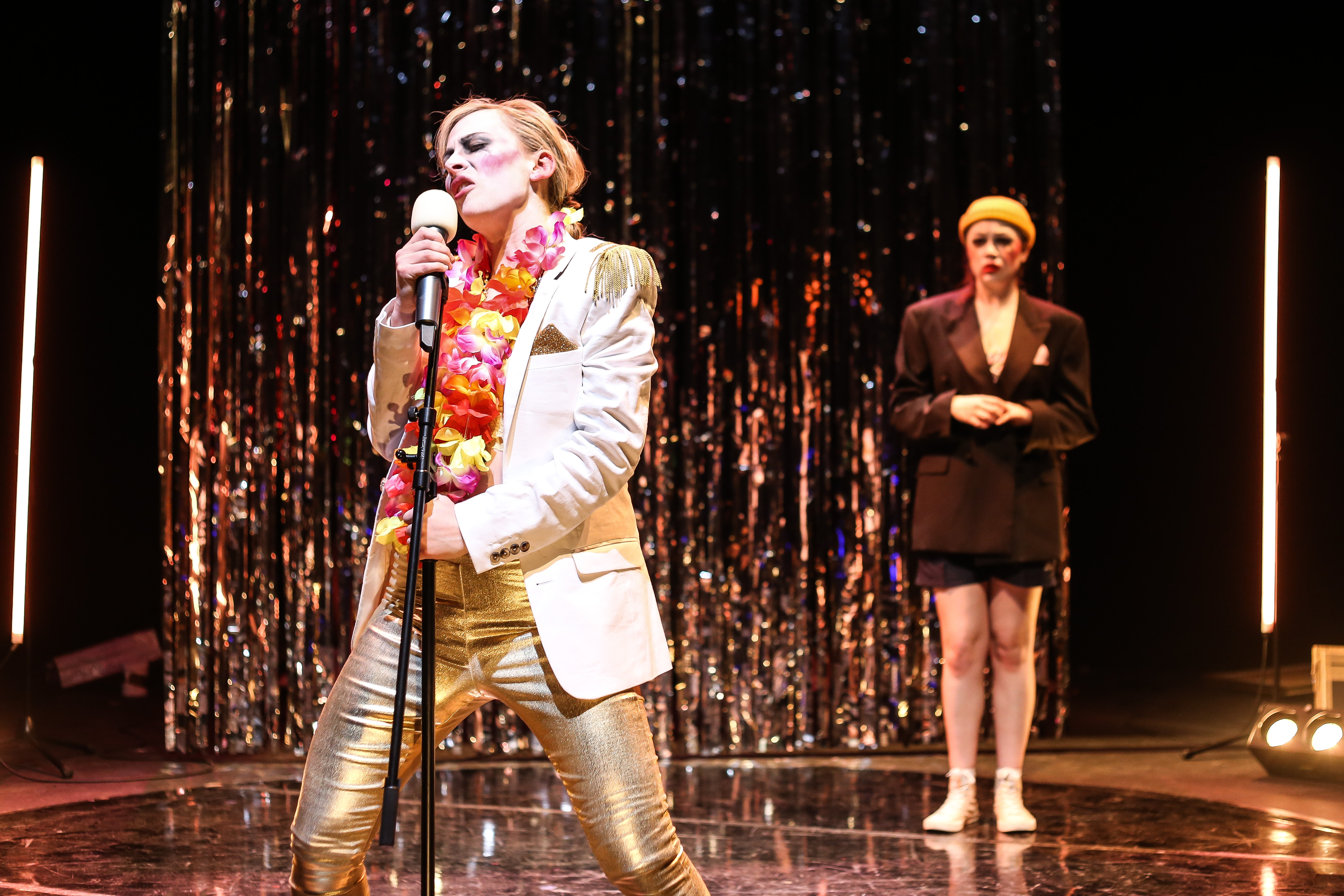Polly (The Heartbreak Opera) – Marie Hamilton & Sharp Teeth Theatre / The Pleasance Theatre, London
Polly (The Heartbreak Opera) goes back into the archives to create a very contemporary adaptation. An obscure 1729 ballad opera is the perfect source material for a modern feminist show? Tell me more!

A Historic Work, Ripe for a Radical Retelling
Do you have to be familiar with John Gay’s The Beggar’s Opera or its sequel in order to appreciate Polly (The Heartbreak Opera) by Marie Hamilton and Sharp Teeth Theatre? No. It might help though. At least read the Wikipedia page for one or the other if you’ve got time.
Wikipedia will explain that The Beggar’s Opera is a 1728 work by John Gay, with Johann Christoph Pepusch arranging the music. It was wildly successful and is actually now the only example of satirical ballad opera which is still popular. The idea was to poke fun at Italian opera, and its wealthy and powerful patrons, through subversion. Rather than grand arias, Gay reused the familiar songs of the day: ballads, hymns, popular tunes and suchlike. And rather than ordinary people being a backdrop of coarse servants and criminals, they are the heroes of the piece.
OK, they’re still criminals, too. The Beggar’s Opera is a story of the criminal underworld in and around Newgate Prison. Notorious highwayman (and womaniser) Macheath; fences and thief-catchers the Peachums; and Macheath’s many romantic interests. The ending subverts the typical moralising finale, with a reprieve for Macheath and a riotous (and surely polygamous?) marriage to Polly Peachum.
In 1729, Gay followed up his successful work with a sequel, working again with Pepusch. Polly transports some characters from The Beggar’s Opera to the Caribbean, as the heroine tries to track down her husband in a tale of pirates, forced prostitution, slavery, colonialism and marriages to indigenous princes. Either because of the content or because Gay wrote it, it was immediately banned for performance (but sold a lot of copies in print). Ultimately it did not enjoy the same success as its predecessor, and has fallen into obscurity.

Polly (The Heartbreak Opera)
At first glance, some might call this obscurity a blessing. Just the brief synopsis above reveals that audiences could expect to encounter racism, colonialism, misogyny, and worse. However, the thing about satire is that satire itself remains popular, even if topical material quickly falls out of date. Enter Sharp Teeth Theatre, who have repurposed elements of the story and created an entirely new satirical musical appropriate for today. Appropriate in how it addresses some of the now unsavoury aspects of the original, and appropriate in who and what it satirises. This is not the first time Gay’s work has received a modern adaptation, by the way. In 1928 Bertolt Brecht and Kurt Weill created The Threepenny Opera from The Beggar’s Opera, introducing us to Mack the Knife. But that’s a story for another day, aside from some Brechtian elements in today’s work.
Back to today’s radical adaptation. In Polly (The Heartbreak Opera) we retain the title character, Polly Peachum. Like the original Polly, she sets off (after a bit of scene-setting) to the Caribbean in search of her errant husband and Cockney highwayman, Macheath. Many troubles befall her, there’s a spot of cross-dressing, and a big climactic ending like you should have in a musical/operatic work. So far so similar.
But Polly (The Heartbreak Opera) also diverges significantly from the original. It’s modern, for one. There’s a nod to 18th century theatrical conventions, and to fashions in the costumes, but this version is set in a tacky modern beach resort. There’s karaoke, machine guns, Lambrini and a very familiar-looking mop-headed politician. The three brides of Macheath (Genevieve Sabherwal as Polly, Marie Hamilton as Lucy Lockitt and Sedona Rose as Jenny Diver – all playing other roles as well) are contemporary, empowered women. What’s a bit depressing to realise is how much of a man’s world it was then and is now. Conversation about whether or not female victims are believed feels very current, but it’s something the ladies of 1729 would surely recognise. The more things change, the more they stay the same.

Back to Brecht
But back to Brecht for a moment. I wrote not that long ago about Brechtian theatre and what that means. If I do a very short and unauthorised summary, it’s about not forgetting that you’re watching a play. Calling out the artifice rather than aiming for naturalism. I would argue that Polly (The Heartbreak Opera) is Brechtian, for instance in its title cards to indicate scene changes, and the excellent Madeline Shann as an on-stage poet/narrator.
So to say there’s a lot of complexity to Polly (The Heartbreak Opera) is an understatement. A forgotten 17th century play. A modern score and script riffing on the original. Contemporary gender politics. Playful costumes. A bit of Brecht. And I haven’t even got on yet to the very pregnant actress in a physically demanding role, who plays both father and mother to her baby.
Does it work? I’m going to say a qualified yes here. I think there are some really great elements here. It plays very well in the Pleasance Theatre‘s cabaret-style set up. The audience enjoyed the jokes and songs, even if we were hard work for the poor Poet when it came to call and response lines. The cast have great voices, and some of the songs (score by Ben Osborn, Madeline Shann and Ellie Showering) are excellent. But I wonder if Polly (The Heartbreak Opera) needs a certain type of audience to appreciate it? One who knows Gay’s work (or has at least perused Wikipedia like *ahem* this reviewer). And also one who appreciates the no-holds-barred approach to gender politics, and politics politics. Perhaps a rather narrow crossover on a Venn diagram? Or am I not giving my fellow theatre goers enough credit?
Perhaps the latter, as Polly (The Heartbreak Opera) has now enjoyed successful runs in Bristol and Salford. If you want to catch it in London you don’t have long: today, in fact. Other than going to Exeter, it’s possibly your only opportunity to see this otherwise obscure work, albeit with a modern twist. So if you feel a pull towards either side of that Venn diagram, or fancy seeing a raucous, feminist, funny and memorable satirical ballad opera, then get yourself a ticket!
Salterton Arts Review’s rating: 3.5/5
Polly (The Heartbreak Opera) on at the Pleasance Theatre London until 11 May 2024 as part of a tour. More info and tickets here.
Trending
If you see this after your page is loaded completely, leafletJS files are missing.

